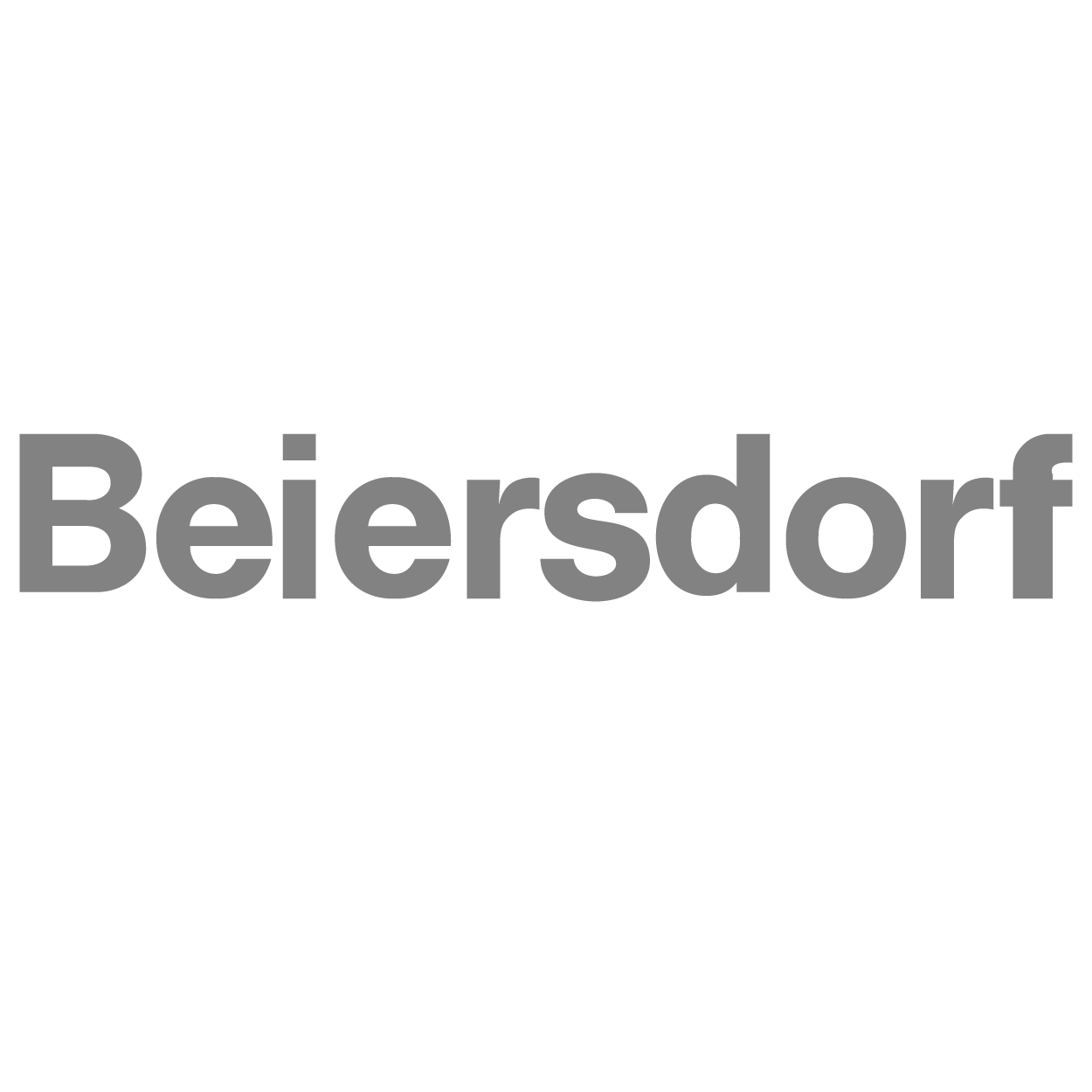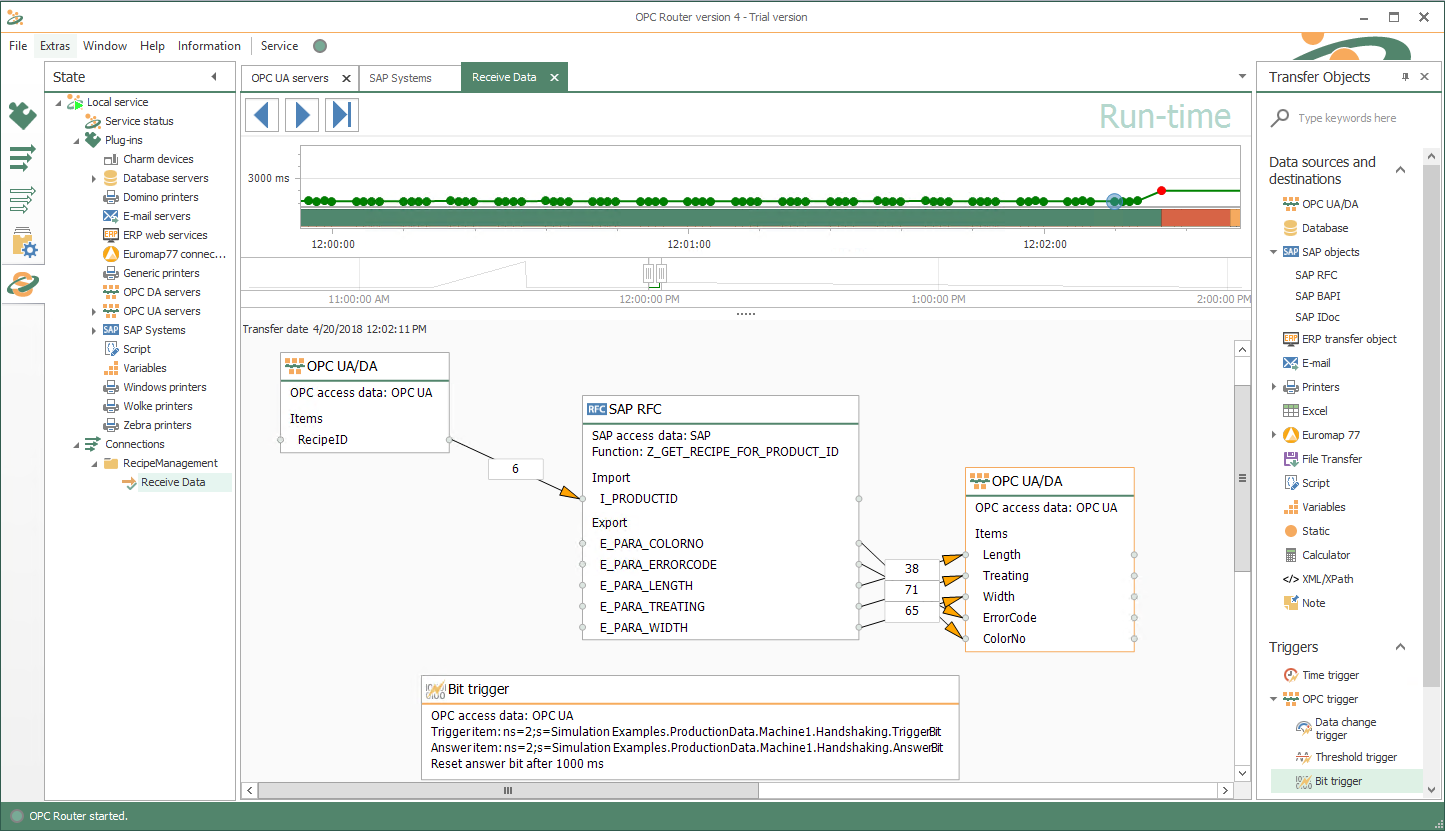Plug-in for your SAP System
Connect SAP Systems efficiently and easily to your system environment
SAP is one of the leading ERP systems in the world. In various industries, SAP systems are the primary system that ensures smooth workflows and processes in a company. That includes all work areas ranging from order management to production management. Various SAP modules aim to optimize workflows by being highly specialized for the respective work profile with its diverse tasks. In the production environment, the OPC Router is aligned closely with PP (Production Planning and Control), PP-PI (Production Planning – Process Industry), PM (Maintenance and Service Management), QM (Quality Management) or EWM (Extended Warehouse Management). Furthermore, the connection to SAP Hana is possible with our SAP Hana Plug-in.
The OPC Router provides all necessary SAP interfaces for accessing SAP, offering connection options via RFC, BAPI and IDoc. That allows SAP data to be distributed and transferred to other systems in many ways, while also transferring data from other systems to SAP.
Watch our video tutorial for how to transfer OPC Data to SAP or find a more detailed video about this topic by visiting our tutorial stream.
These and other customers rely on the OPC Router






That’s how easy it is.
SAP connection via drag & drop
The coupling of SAP with your system environment is easy and intuitive with the OPC Router via drag & drop. In our screenshot, you can see an example of how the connection works. An RFC function using an ID as input parameter gets called here. An OPC UA server has read the parameter which triggers the transmission with a bit trigger. In other words, the PLC triggers the data transfer by an item that is set to true when the PLC needs the data. After the function call, the output parameters of the RFC function are written back from SAP to OPC, in this case to the PLC, and the trigger acknowledges the data transfer by setting another item in the PLC to “true”.
Efficient data transfers to SAP via OPC UA
- Achieving more with coupled systems:
By connecting SAP systems via the OPC Router, you can transfer production-relevant data to PLCs, label printers or other networked devices in production. That prevents manual intervention and recording as well as paper traffic. - Industry 4.0 with SAP systems:
Connecting SAP systems to your production systems opens many ways for data and thus enables the implementation of Industry 4.0. The basic idea that a customer order finds its way to the machine, from SAP to the PLC and back, becomes possible. - About the OPC Router:
With the OPC Router, you can graphically realize the networking of your systems. It features simple configuration, sophisticated monitoring and robustness. Numerous Plug-ins make it a middleware in the industrial environment and a suitable alternative for other SAP products such as SAP PCo (Plant Connectivity).
SAP systems Plug-in application examples
Control production flow by direct RFC call-up
Automation devices must control the product at many points in the production process. Deciding criteria are releases, quality, storage capacities, line occupancy, etc. For making these control decisions, the respective automation device must query the decision with the system that has all the data it needs to make the decision. The SAP system is often the leading system for this. The OPC Client Plug-in combined with the SAP Plug-in makes this connection feasible. A PLC can use it to trigger a synchronous RFC function call in SAP, passing on the input values and receiving the instruction for the steering process as a return. For the production process, the execution as a synchronous RFC call is essential since the result is immediately available so that the control process executes immediately.
Production confirmations via IDoc to SAP
Production generates a wide range of data that the SAP system requires for production planning. Among the production messages are data on finished goods, raw materials, packaging and resource consumption, as well as machine running times and statuses. This data allows raw material procurements planning, inventory updates, and machine maintenance scheduling. Automatic data transfer from the machine to the SAP system saves time, eliminates manual data entry, and provides more accurate and up-to-date data. Instead of a synchronous transfer via the RFC function, such messages can be sent very well as IDocs to SAP. An IDoc is a message packet that is processed asynchronously. The production process is consequently not dependent on the processing of the data. In SAP, the IDocs are then buffered in a queue and processed. However, this is also possible from SAP to production. For example, material master data or production orders can be sent as IDocs from SAP to the OPC router, which then processes them one after the other and transfers them to the target systems, e.g. to the production database.
Video: Easy transfer of OPC Data to SAP
This video tutorial shows how easy it is to connect an OPC UA Server with SAP systems using the OPC Router. In this example, a production order id is used as an input parameter for a remote callable function (RFC) at SAP and returns corresponding example recipe data for a machine. Just link the OPC UA product ID data point to the SAP RFC box and connect the corresponding return parameters to the respective recipe data points on the OPC UA side simply by drag & drop.
Connecting Systems with the OPC Router SAP Plug-in
Transfer Objects
Three transfer objects are available in the SAP system Plug-in for connecting with RFC, BAPI and IDoc.
RFC
An RFC is used to call-up a function in an SAP system. Import and export parameters of several types can be used (simple, structures, tables). The calls get executed synchronously.
BAPI
BAPIs are standard interfaces of the SAP system and allow access to methods of business objects. As with RFCs, functions and their parameters (simple, structures, tables) get addressed. The call is also synchronous.
IDoc
The IDoc data format addresses asynchronous data transmission. IDocs represent structured documents used to send and receive transaction-based data to and from the SAP system.
Trigger
The SAP Systems Plug-in contains an RFC-Trigger.
RFC-Trigger
The RFC Trigger allows you to provide an RFC Function within the OPC Router. You can retrieve this function from an SAP system by creating the OPC Router as an external system. When calling the RFC function in the OPC Router, it is possible to transfer data that the trigger provides as data fields in the connection.
Browsing
The SAP system Plug-in can browse the available RFCs, BAPIs, and IDocs from the SAP system.
RFC and BAPI
For the types of RFC and BAPI, the existing functions and objects can be filtered and selected. About the selection, the simple, structured and table parameters are available for selection.
IDoc SAP System
The IDoc types configured in the SAP system are read by the OPC Router. The structure of the selected IDoc is displayed in the object so that the required IDoc data fields can be used in the transfer structure.

